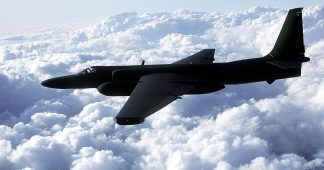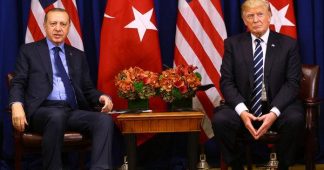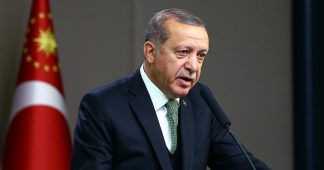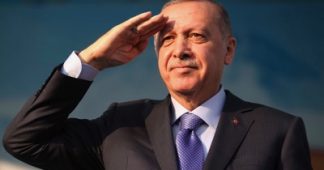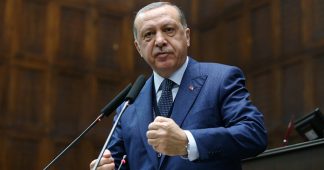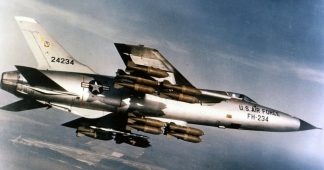This is not the first time the presence of American nuclear weapons in Turkey has been part of a crisis.
By: Matthew Wills
Fifty U.S. nuclear bombs are stored at Incirlik Air Base in southern Turkey. Tensions between the U.S. and Turkey over Syria are nearing a boiling point. What will now be done about these bombs? Is it time to take American nuclear weapons out of Turkey?
What many people don’t realize in approaching this question is that this is not the first time the presence of American nuclear weapons in Turkey has been part of a crisis. The first time was during the Cuban Missile Crisis of October 1962—only hardly anybody knew it at the time. For almost two weeks that October, the world was on the brink of nuclear war, until the Soviets caved to the threat of force… or so runs the American version of events.
The Cuban Missile Crisis, to summarize in brief, began when Americans realized that the U.S.S.R. had positioned ballistic missiles in Cuba, 90 miles from the U.S. mainland. This Soviet move was a response to the U.S.-sponsored Bay of Pigs invasion. Although a failure, the invasion convinced Fidel Castro of the existential threat to his government, and he turned to his allies for help in defending Cuba.
The U.S. interpreted the Soviet missiles as offensive, not defensive. After dramatically revealing the presence of the missiles at the U.N., President John F. Kennedy’s administration instituted a naval blockade of Cuba. Most Americans remember that the Crisis was resolved when the Soviets backed down. Dean Rusk, the Secretary of State, sounded the victory bugle: “We were eyeball to eyeball, and the other fellow just blinked.” The “other fellow” did, indeed, remove the missiles from Cuba.
“U.S policymakers exalted in an apparently unqualified victory,” writes the political scientist James N. Nathan in Foreign Affairs. He thinks this is precisely the wrong lesson to draw from the events. “‘Resolve’ became the watchword of Washington’s Cold War policy,” leading “a succession of administrations [to] discard the classic repertoire of diplomacy: international law, a respect for negotiation, and a prudent definition of the national interest.”
In reality, there was a quid pro quo for the Soviet retreat. In return for the Soviet withdrawal of nukes from Cuba, the Americans would remove their nukes from Turkey. The Cuban Missile Crisis’s resolution was, in fact, a triumph of compromise centered half a world away.
The U.S. weapons in Turkey were Jupiter intermediate-range ballistic missiles. They had been positioned in Turkey in 1961. The Jupiters, writes the historian Barton J. Bernstein, were “liquid-fuel I.R.B.M.s, taking hours to fire, quite inaccurate, very vulnerable, and hence only useful for a first strike, and thus provocative.” Turkey and the old U.S.S.R. shared a border, so the Soviets were already in the position the Americans interpreted as hostile a couple of years later: an enemy’s nuclear weapons at their doorstep.
The American public was largely kept out of the loop about this missiles-for-missiles diplomacy, conducted by the President, his brother Robert Kennedy, and Secretary of State Dean Rusk in parallel with the saber-rattling. It was the nerve-wracking brinksmanship at sea, wet eyeball to wet eyeball, not the backroom wheeling and dealing, that made the news.
“All stick, no carrot” is, in many peoples’ minds, the story of how the Cuban Missile Crisis was resolved. The U.S., after all, did not publicize the removal of missiles from Turkey, an operation completed two years later, in 1963. In fact, quite the opposite: “Rusk and U.S. Secretary of Defense Robert McNamara repeatedly lied to Congress,” Nathan writes in Foreign Affairs, “about the settlement that ended the crisis.” He continues:
The facts of the compromise were long veiled. It was not until 1989 that Kennedy’s former speechwriter, Theodore Sorensen, confessed that he had edited out the details of the missile swap from the published version of Attorney General Robert Kennedy’s diary.
The Soviets, no strangers to secrets and lies, had agreed to keep the understanding over the missile removal swap on the down low. This made them look like the losers in Cuba, but the ways of diplomacy are often hidden from the public.
Published at https://daily.jstor.org/us-nuclear-weapons-turkey-part-2/
